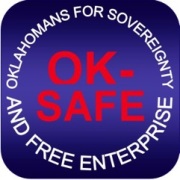Hypocrisy is defined as “the state of pretending to have beliefs, opinions, virtues, feelings, qualities, or standards that one does not actually have, or applying a criticism to others that one does not apply to oneself. Hypocrisy involves the deception of others and is thus a kind of lie.”
Most, if not all, of the current crop of OK Republicans campaigned in 2010 against what the public often calls “ObamaCare” (the Patient Protection and Affordable Care Act, or PPACA). Oklahomans opposed this bill in its entirety, not just the individual mandate. That opposition included the development of state-run exchanges.
Today, however, the OK House passed, albeit narrowly, a controversial piece of enabling legislation authored by Speaker Kris Steele; HB 2130, paving the way for the further implementation of “ObamaCare” in Oklahoma via health care exchanges.
The Republican arguments in support of this idea included citing the Heritage Foundation, OCPA, and Sen. Tom Coburn as supportive of the creation of these health care exchanges.*
Rep. Glen Mulready, presenting the bill for Steele, claimed at one point that the idea of health insurance exchanges was “highjacked” by ObamaCare. (The flaw in this logic is that if the exchanges are so “conservative” how did they end up being the cornerstone of the entire PPACA socialized medicine Act, being mentioned 278 times and funded through federal grant money?) Something doesn’t compute, Rep. Mulready.
HB 2130, defining the governance of the HUB responsible for planning and implementing the Health Insurance Exchange in Oklahoma, included an amendment created at a “facilitated” meeting of a Health Information Exchange Stakeholder group held at Shepherd Mall the day before the vote.
The state recently accepted $54 million to develop the IT support system necessary to “reinvent” the health care delivery system, which includes the health insurance exchange. (The HIE enables the transfer of electronic medical/health records – called EMRs/EHRs – between health care providers.)
The Grim Future
The future of medical care is this: The Health Insurance Exchange will eventually be connected to the “other” exchange – the Health Information Exchange (HIE). [The HIE enables the transfer of electronic medical records – called EMRs – between health care providers.]
We will live with both Managed Care and Managed Competition in an e-health system where invisible “Navigators” help consumers (not customers, consumers) make “appropriate” health care choices online; where actually visiting a real doctor is limited to “qualified” consumers; where everyone has a health ID card tied to their bank; where people are indirectly forced to participate in state-run exchanges in order to qualify for the tax credits necessary to offset their new $24,000/person annual health insurance premiums; and where no single insurance carrier will be burdened with too many sick people.
(“Navigators” are part of the PPACA law, too.)
Oh, and medical advise and/or treatment will be offered online, issued by a software program that has determined your treatment based on analyzing your accumulated electronic health “data”.
A grim future indeed.
The 51 Yes Votes (italics=Democrat, bold=Tulsa county):
Armes, Banz, Billy, Cannaday, Casey, Cockroft, Coody, Cooksey, Denney, DeWitt, Farley, Grau, Hall, Hardin, Hickman, Jackson, Johnson, Jordan, Joyner, Liebmann, Martin (Sc.), Martin (St.), McAffrey, McCullough, McDaniel (J.), McNiel, Mulready, Nelson, Newell, Nollan, Ortega, Ownbey, Peters, Peterson, Pruett, Quinn, Richardson, Roberts (D.), Russ, Sanders, Scott, Sears, Shannon, Stiles, Sullivan, Thomsen, Tibbs, Virgin, Watson, Wright, and Mr. Speaker (Steele).
The 34 No Votes (italics=Democrat, bold=Tulsa County):
Bennett, Blackwell, Brumbaugh, Christian, Condit, Derby, Dorman, Faught, Fourkiller, Glenn, Hamilton, Hilliard, Holland, Hoskin, Inman, Kern, Key, Kirby, Kouplen, Lockhart, McDaniel (R.), Moore, Morrissette, Murphey, Proctor, Reynolds, Ritze, Rousselot, Schwartz, Sherrer, Terrill, Vaughan, Wesselhoft, Williams.
The Excused Votes (italics=Democrat; bold=Tulsa County):
Brown, Cox, Dank, Enns, McPeak, Morgan, Osborn, Pittman, Renegar, Roan, Roberts (S.), Shelton, Shoemake, Shumate, Trebilcock, Walker. (That’s a lot of people off the floor for a vote.)
The 51 who voted for this bad bill need to hear from every Oklahoman; the 34 who voted No need to be thanked.
Call OK House Members:1-800-522-8502, 405-521-2711
Email OK House Members: Current List here.
HB 2130 now moves to the Senate where the ‘spin’ on this bill will continue.
*This fallacy, called an Appeal to Authority, is used as an intimidation tactic to quell opposition. “Appeals to Authority (One, Many, or Elite) – A fallacious Appeal to Authority attempts to persuade by leveraging expertise, tradition, boasted credentials, fame, social status, celebrity, etc., when these characteristics do not necessarily pertain to the issue at hand. Even when cited authorities have legitimate expertise in the topic, their expertise itself does not guarantee the truth of the argument under discussion…” and “The fallacy assumes a link between authority and truth that does not of necessity exist.” Source: Biblical Logic, by Joel McDurmon.







